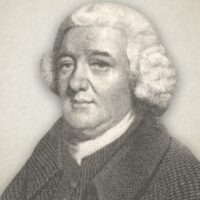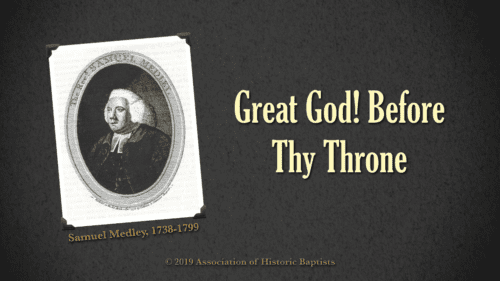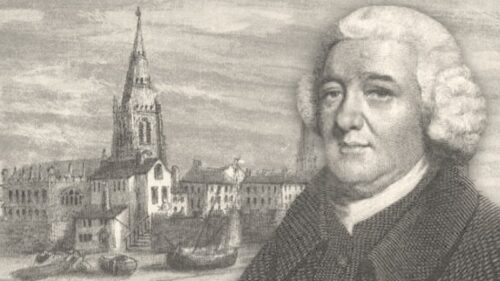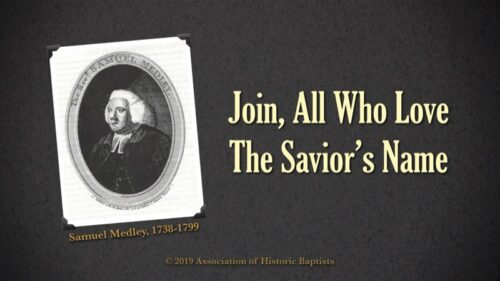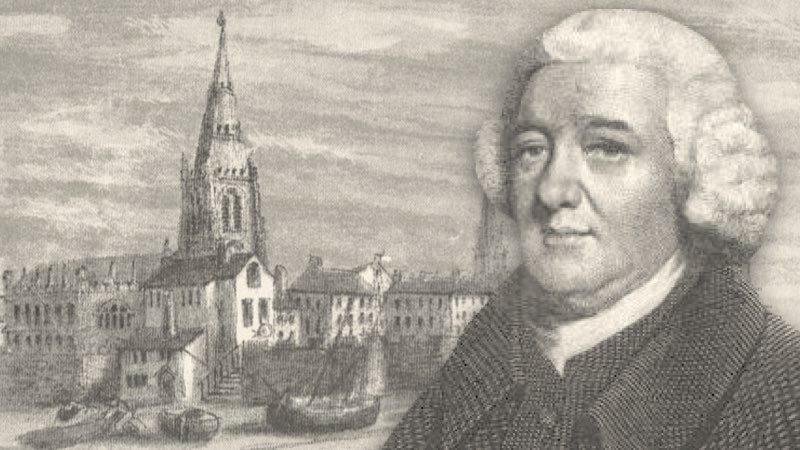
A Farewell Sermon
[Notes Of A Farewell Sermon Preached By Samuel Medley At The Tabernacle, Moorfields, April 1st, 1787]
“And exhorted them all, that with purpose of heart they would cleave unto the Lord.”—Acts 11:23
It is needful, in order to observe the scope of our text, that we read it in its connection, from the 19th verse of the chapter, and particularly the preceding clause of the verse which contains our text, “They sent forth Barnabas, that he should go as far as Antioch. Who, when he came, and had seen the grace of God, was glad, and exhorted,” &c.—that is, the Gentile converts in the city of Corinth. And oh, how truly kind, affectionate, suitable, and seasonable must this his exhortation have been to them! God, in mercy, make it so at this time to us all, especially to those who have so lately made a solemn public and personal profession of the Lord Jesus Christ in this place.
[Several persons had been baptized in the morning of the day, and were now about to be received into Church fellowship at the Lord’s table. In this view, the sermon is of great weight and importance.]Surely the practice here exhorted to, even that of cleaving to the Lord, in so doing consists much—yea, the whole—of the believer’s comfort, peace, honour, and the enjoyment of present happiness. May the Lord the Spirit own the attempt, while in speaking I attend to the following particulars:—
1. Show what cleaving to the Lord is expressive of, and who are the persons that are here exhorted so to do.
2. Consider the object which they are exhorted to cleave unto, viz., “the Lord,” and show what is included in it.
3. Consider the manner in which they are exhorted so to do.
4. Mention some reasons to prove the propriety and necessity for the exhortation, and of our attention to and practice of it.
5. Make some improvement.
1. Cleaving to the Lord is frequently spoken of in the sacred Scriptures. “That thou mayest love the Lord thy God, and that thou mayest obey His voice, and that thou mayest cleave unto Him: for He is thy life,” &c. (Deut. 30:20). “For as the girdle cleaveth to the loins of a man, so have I caused to cleave unto Me the whole house of Israel, saith the Lord,” &c. (Jer. 13:11). “Abhor that which is evil; cleave to that which is good” (Rom. 12:9). But I will show what it is expressive of. Cleaving to the Lord is expressive of love and affection to Him. It is expressive of pursuit or following after Him. “Where thou goest, I will go” (Ruth 1:16). It is expressive of adherence to Him, even the closest attachment of the soul. It is expressive of abiding by Him at all times—not forsaking or departing from Him. It is expressive of that pleasure and delight which the soul takes in Him. It is expressive of resting in Him, and of full satisfaction with Him. See the whole of this beautifully exemplified in the case of Ruth towards Naomi. Orpah kissed her mother-in-law and went back, but Ruth clave unto her. “And Ruth said, Intreat me not to leave thee, or to return from following after thee: for whither thou goest, I will go,” &c.
Then, who those are that are exhorted to cleave to the Lord. “Them all,” says the text. Those on whom the hand of the Lord was (see ver. 21 ), the “much people” that was added to the Lord. Now, it is very plain, from the account here given, that they were most of them young Christians—persons newly called by sovereign grace, and who had lately made a public profession of their faith—who had been recently baptized and had joined the church—or, rather, were the first members who formed the Church at Antioch, and who were gathered together through the Holy Ghost’s blessing upon the labours of the men of Cyprus and Cyrene in preaching the Lord Jesus. The hand of the Lord was with these Gospel preachers, so that a great number believed and turned to the Lord. Nevertheless, “them all” may well apply to us all who have believed in the Name of the Son of God—the elder of us, as well, and as much as the younger. I will now—
2. Consider the object which they are exhorted to cleave unto, “The Lord,” and show what is included in it. Cleaving to the Lord includes in it a cleaving to the Name of the Lord, that is, the Lord Jesus Christ. It includes a cleaving to the grace and love of the Lord. It includes a cleaving to the Holy Word and glorious Gospel of the Lord. It includes a cleaving to the sacred worship and the instituted ordinances of the Lord. It includes a cleaving to the society and fellowship of the people of God, who are the followers of the Lord. It includes a cleaving to a holy life, walk, and conversation, becoming their profession of the Name of the Lord. It includes a cleaving to the faith, hope, and expectation of the promised and prepared kingdom, glory, and full salvation of the Lord.
3. Consider the manner in which they are exhorted in the text to cleave to the Lord, “With purpose of heart:” that is, sincerely and uprightly—not hypocritically—but firmly and fixedly, with a holy courage and fixed resolution; seriously and solemnly as before Him and under His eye, who is the Searcher of the heart; humbly and self-diffidently, not proudly; willingly and cheerfully, not forcedly; entirely and universally, with the whole heart; lovingly and affectionately, as to a Father; constantly and closely, as Ruth to Naomi; increasingly and perseveringly, more and more; thankfully, joyfully, and assuredly; everlastingly, for and with a view to eternity.
4. Mention and assign some reasons to prove the necessity and propriety of the exhortation, and of our attention to and practice of it. Because the glory of God is closely and inseparably connected herewith; because the truth and honour of our Christian profession is discovered thereby; because the peace and comfort of all our fellow-saints is much concerned therein; because of the solemn public and personal profession we have made; because there are many who backslide, and fall away from their profession; because there are many enemies who watch for our halting and long for our stumbling in the ways of God; because it is only in so doing that we either shall or can be saved at last. “He that endureth to the end shall be saved” (Matt. 10:22).
5. Make some improvement. How suitable, solemn, and seasonable a word is this to us all, and especially to you all, my dear young friends, who have this day made a solemn profession of our Lord Jesus Christ in His own instituted ordinance of believers’ baptism. The Lord graciously enable you to meditate and plead and pray over these words daily and increasingly as long as you live. May the falls and backslidings of others around us be our humbling and warning before the Lord. Thus, then, I conclude, and in the name, the love, the bonds, and the bowels of the Lord Jesus Christ, I exhort you all to cleave to the Lord with purpose of heart. Even so, Amen, and Amen.
Samuel Medley (1738-1799) was a Particular Baptist preacher and hymn writer. He was appointed the pastor of a church on Byrom Street, Liverpool, where he served for twenty-seven years.



